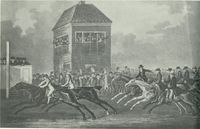Annotation:New Market Jig: Difference between revisions
No edit summary |
Alan Snyder (talk | contribs) (Fix HTML, citation) |
||
| Line 6: | Line 6: | ||
<br> | <br> | ||
New Market [http://en.wikipedia.org/wiki/Newmarket,_Suffolk] was famous in the 17th and 18th centuries for the exhibition of horse-races that catered to the British aristocracy and royalty since James I (who built a residence there in 1605). It was also a home to Charles II and numerous other monarchs, and remains famous today. The town itself is in Suffolk, approx. 65 miles northeast of London. A song called the "New Market Horse Race" was printed in the periodical '''The Weekly amusement: or, The universal magazine''' in 1735: | New Market [http://en.wikipedia.org/wiki/Newmarket,_Suffolk] was famous in the 17th and 18th centuries for the exhibition of horse-races that catered to the British aristocracy and royalty since James I (who built a residence there in 1605). It was also a home to Charles II and numerous other monarchs, and remains famous today. The town itself is in Suffolk, approx. 65 miles northeast of London. A song called the "New Market Horse Race" was printed in the periodical '''The Weekly amusement: or, The universal magazine''' in 1735: | ||
</font></p> | |||
[[File:newmarketrace.jpg|200px|thumb|right|Newmarket Race]] | [[File:newmarketrace.jpg|200px|thumb|right|Newmarket Race]] | ||
<blockquote> | <blockquote><font face="garamond, serif" size="4"><i> | ||
''To horse, brave boys of New-market, to horse,''<br> | ''To horse, brave boys of New-market, to horse,''<br> | ||
''You'll loose the match by longer delaying;''<br> | ''You'll loose the match by longer delaying;''<br> | ||
| Line 22: | Line 23: | ||
''He cannot endure it, he cannot, he wonnot now run it,''<br> | ''He cannot endure it, he cannot, he wonnot now run it,''<br> | ||
''Age, age does hinder the speed, sir.''<br> | ''Age, age does hinder the speed, sir.''<br> | ||
</ | </i></font></blockquote> | ||
</font></ | |||
<p><font face="garamond, serif" size="4"> | <p><font face="garamond, serif" size="4"> | ||
<br> | |||
''Source for notated version'': | ''Source for notated version'': | ||
<br> | <br> | ||
| Line 30: | Line 31: | ||
</font></p> | </font></p> | ||
<p><font face="garamond, serif" size="4"> | <p><font face="garamond, serif" size="4"> | ||
''Printed sources'': Carlin ('''The Gow Collection'''), 1986; No. 364. Gow ('''Complete Repository, | ''Printed sources'': | ||
Carlin ('''The Gow Collection'''), 1986; No. 364. | |||
Gow ('''Complete Repository, Part 2'''), 1802; pp. 8–9. | |||
Howe ('''1000 Jigs and Reels'''), c. 1867; p. 141 (appears as "John Paterson's Mare Goes Forewort"). | |||
<br> | <br> | ||
<br> | <br> | ||
| Line 38: | Line 42: | ||
</font></p> | </font></p> | ||
<br> | <br> | ||
<br> | <br style="clear:both"/> | ||
---- | ---- | ||
=='''Back to [[{{BASEPAGENAME}}]]'''== | =='''Back to [[{{BASEPAGENAME}}]]'''== | ||
Revision as of 01:17, 9 March 2017
Back to New Market Jig
NEW MARKET JIG. AKA and see "Black and the Grey (1) (The)," "John Patterson's Mare," "John Patterson's Mare Goes Foremost," "John Paterson's Mare Goes Foremost," "John Paterson's Mare Goes Forewort." Scottish, English; Jig. England, Northumberland. F Major. Standard tuning (fiddle). ABCD. Howe (c. 1867) directs: "Performed in the time of Horse Gallop." The alternate title "John Paterson's Mare Goes Foremost" is from a song written to the melody.
New Market [1] was famous in the 17th and 18th centuries for the exhibition of horse-races that catered to the British aristocracy and royalty since James I (who built a residence there in 1605). It was also a home to Charles II and numerous other monarchs, and remains famous today. The town itself is in Suffolk, approx. 65 miles northeast of London. A song called the "New Market Horse Race" was printed in the periodical The Weekly amusement: or, The universal magazine in 1735:

To horse, brave boys of New-market, to horse,
You'll loose the match by longer delaying;
The gelding just now was led over the course,
I think the devil's in you for staying.
Run, and endeavour all to bubble the sporters,
Bets may recover all lost at the groom-porter's;
Follow, follow, follow, follow, come down to the ditch,
Take the odds, and then you'll be rich.
For I'll have the brown bay, if the blew bonnet ride,
And hold a thousand pounds of his side, sir;
Dragon would scour it, but Dragon grows old,
He cannot endure it, he cannot, he wonnot now run it,
Age, age does hinder the speed, sir.
Source for notated version:
Printed sources:
Carlin (The Gow Collection), 1986; No. 364.
Gow (Complete Repository, Part 2), 1802; pp. 8–9.
Howe (1000 Jigs and Reels), c. 1867; p. 141 (appears as "John Paterson's Mare Goes Forewort").
Recorded sources:
